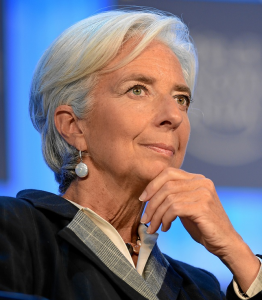“It is just the right moment to introduce carbon taxes,” declared IMF director Christine Lagarde yesterday at the joint annual meeting of the International Monetary Fund and World Bank in Lima, Peru. In a panel discussion that included World Bank President Jim Yong Kim and the celebrated climate economist Nicholas Stern, Lagarde urged governments to directly tax carbon emissions instead of relying on indirect measures such as emissions trading. “A lot of people would rather do emissions trading systems, but we believe that carbon taxation would be a lot better,” she said.
Lagarde pointed out that in addition to their primary purpose of discouraging pollution, taxes on greenhouse gas emissions boost revenues ― a key consideration when many governments have depleted their reserves to weather the long weakness in the global economy. She explained,
Finance ministers are looking for revenues. That’s the fate of finance ministers. But it’s particularly the case at the moment because many have already used a lot of their fiscal buffers … and are always in need of some fiscal buffers in order to fight the next crisis.
Lagarde’s remarks came one day after another carbon tax proponent assumed the reins of the world’s most important climate body. Dr. Hoesung Lee, the new chair of the UN Intergovermental Panel on Climate Change (IPCC), has stressed the the need to price the “externalities” of carbon pollution. In an interview last month (published yesterday), Lee explained:
[When] my action affects other persons’ welfare, but I do not pay for these disadvantages… those are externalities. Climate change is a typical example … [T]he way to correct the externality problem is to have a price on certain activities that cause those externalities … a carbon tax.
Lee ranks a carbon tax as his ― and now, perhaps, the IPCC’s ― highest priority:
[I]f you ask me to choose the most important work in climate change issues, then I’ll choose carbon price. That’s because it is the driver to put us into the right track.
With their unequivocal endorsement of carbon taxes, Legarde and Lee add to the pressure on UN climate negotiators to end two decades of fruitless haggling over national level emissions limits and to focus explicitly on pricing carbon pollution instead.

